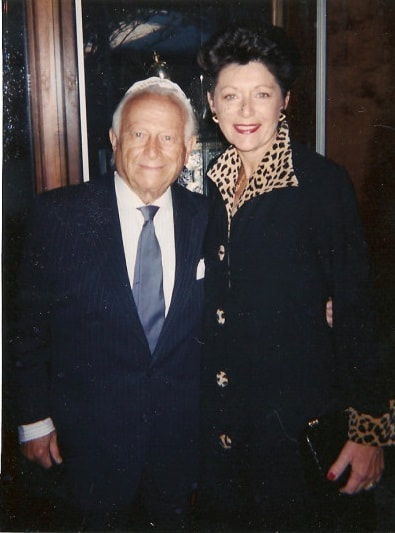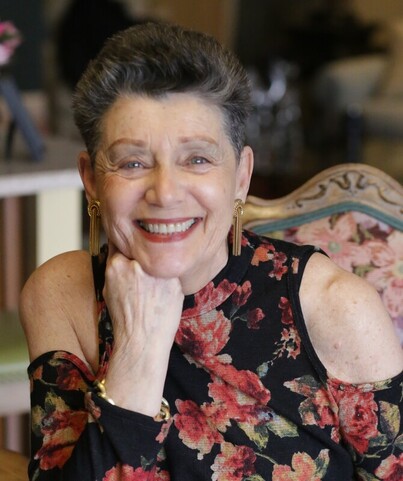Essays, Chapbooks, Contests...Etcetera
RITA PLUSH:
Author & Speaker
Author & Speaker
A Dancing Man
|
An outgoing kind of guy, game for anything, he used to say of himself, my father was lonely and at loose ends after my mother died; they’d been married 63 years. So it didn’t surprise me when I learned he was heading into NYC for a night on the town with Lenny, his 40-something neighbor who lived in his parents’ basement.
“I go to the Waldorf all the time,” Lenny had said. Did my father have a tuxedo? Done up to the nines, they hopped an E train. Basement Lenny knew his way around the Waldorf. They skirted the coat check and made for the Ballroom. A snazzy affair this $1,000-per-plate fundraiser, women in evening gowns, men in black tie. A team of harpists plucked strings while servers in white passed hors d'œuvres on silver trays. So at ease, my father, he might have been at a grandchild’s wedding. “May I have this dance?” he asked a woman at the rim of the dance floor. Arthur Murray had nothing on my father. The orchestra finished the set; the lights dimmed. Time for dinner. Don’t sit right away, Lenny had coached him. There were always people who didn’t show. “When you see an empty seat, go for it.” He waited it out, eyed an unoccupied chair. “A pleasant good evening,” he said to his tablemate. The woman smiled, they started chatting. Just as he was about to say, “I think I’ll have the salmon,” a bruiser in a black suit tapped him on the shoulder, and he didn’t want the next dance! “Your ticket, sir.” Busted! |
Rita with Her Dad (Max Weingarten)
|
Sir rummaged through his pockets and made a big show of looking for nonexistent voucher. “I must have left it in my coat. I’ll get it.” The man in black followed, stood by the door, feet astride, hands locked behind him. He’d seen this type before. He’d also seen Lenny.
The Vince Vaughn and Owen Wilson wannabes broke into a run down the nearest set of stairs. Out in the street, my father got his breath back. “I thought you never get caught!”
“Once in a while,” Lenny said, batting his hand as if to swat a fly. “Did you get a load of those baby lamb chops?” Then, “Hey! I saw you on the dance floor. You got some good moves there. Ever think about a job as a dance host? It’s a free cruise!”
My father sent for an application. I helped him fill it out, shaving ten years off his age to meet the limit of 75.
Let the women do the talking when you’re dancing, advised his interviewer when she got an earful of his non-stop narratives.
“I think I have too much personality,” he told me afterwards.
And thus began his stint as a dance host on Holland America, tripping the light fantastic with unescorted women. He was asked to host on another cruise, but his appetite for the high seas had been met and he settled down to winter in Florida. There, dapper in his pocket hanky and white patent shoes, he had no lack of dancing partners. The suntanned, senior set was eager to grant him a rhumba or two.
Among the many grantees was a lovely woman with a nest egg of her own. She believed that the car a man drove was an indication of his status in the world. She’d told her friends she’d never date a man who owned a lesser car than she did. When they asked what kind of wheels this new fellow sported, she said he didn’t drive a car. “He rides a bicycle.”
A bicycle with a heart-shaped balloon, announcing Be My Valentine, tied to the handlebars that became the talk of the senior condos. “There’s this cute story going around about an old guy with a balloon on his bicycle dating a woman with a Caddy,” one of my friends who had a place down there began to tell me.
“That’s no old guy,” I said. “That’s my father.”
So, he was seeing someone. And from what I could gather after meeting her, she was charming, even-tempered, with a lovely smile and manner. Her eyes lit up when she looked at him. My father? The man who taught me how to take-away and pay back in arithmetic, who taught me how to ride a two-wheeler so many years ago, was now a catch. A groom again at 86.
They were married seven years when the dizzy spells began; he’d lost weight. The most telling symptom: he was quiet. My father was never quiet. If he wasn’t talking, he was moving—fixing, planting, riding his bike around his neighborhood without a helmet.
He was hospitalized. Tests showed he’d developed leukemia and there was a blockage in his kidney. He had only one. The other was removed when he was 35. Cancer? No one ever said. Like sex, cancer was a taboo subject back in the 40s.
He was 93. His body was breaking down; he was dying and he knew it. “Call that doctor,” he said. His index finger made a slashing gesture under his chin.
“Kevorkian?” I said. “It’s illegal.”
But another part of him wanted to live. “What do you think,” he asked me after the doctors had suggested surgery to clear the blockage, but I put it back on him. “What do you think, Dad?”
After the surgery, the doctors told him the hospital had done all they could. He would be transferred to a nursing home the next day. He’d sworn he’d never go to such a place after the suffering my mother had endured. “Shoot me first.”
When the phone rang early the next morning it was the rabbi from the hospital. “… he was a remarkable man,” the rabbi said. He’d sat with my father during the night.
I don’t know what my father said to him, what secrets, philosophies or regrets he might have shared with the rabbi. But that he was remarkable, I already knew.
This essay was previously published in Flash Fiction Magazine (2020)
The Vince Vaughn and Owen Wilson wannabes broke into a run down the nearest set of stairs. Out in the street, my father got his breath back. “I thought you never get caught!”
“Once in a while,” Lenny said, batting his hand as if to swat a fly. “Did you get a load of those baby lamb chops?” Then, “Hey! I saw you on the dance floor. You got some good moves there. Ever think about a job as a dance host? It’s a free cruise!”
My father sent for an application. I helped him fill it out, shaving ten years off his age to meet the limit of 75.
Let the women do the talking when you’re dancing, advised his interviewer when she got an earful of his non-stop narratives.
“I think I have too much personality,” he told me afterwards.
And thus began his stint as a dance host on Holland America, tripping the light fantastic with unescorted women. He was asked to host on another cruise, but his appetite for the high seas had been met and he settled down to winter in Florida. There, dapper in his pocket hanky and white patent shoes, he had no lack of dancing partners. The suntanned, senior set was eager to grant him a rhumba or two.
Among the many grantees was a lovely woman with a nest egg of her own. She believed that the car a man drove was an indication of his status in the world. She’d told her friends she’d never date a man who owned a lesser car than she did. When they asked what kind of wheels this new fellow sported, she said he didn’t drive a car. “He rides a bicycle.”
A bicycle with a heart-shaped balloon, announcing Be My Valentine, tied to the handlebars that became the talk of the senior condos. “There’s this cute story going around about an old guy with a balloon on his bicycle dating a woman with a Caddy,” one of my friends who had a place down there began to tell me.
“That’s no old guy,” I said. “That’s my father.”
So, he was seeing someone. And from what I could gather after meeting her, she was charming, even-tempered, with a lovely smile and manner. Her eyes lit up when she looked at him. My father? The man who taught me how to take-away and pay back in arithmetic, who taught me how to ride a two-wheeler so many years ago, was now a catch. A groom again at 86.
They were married seven years when the dizzy spells began; he’d lost weight. The most telling symptom: he was quiet. My father was never quiet. If he wasn’t talking, he was moving—fixing, planting, riding his bike around his neighborhood without a helmet.
He was hospitalized. Tests showed he’d developed leukemia and there was a blockage in his kidney. He had only one. The other was removed when he was 35. Cancer? No one ever said. Like sex, cancer was a taboo subject back in the 40s.
He was 93. His body was breaking down; he was dying and he knew it. “Call that doctor,” he said. His index finger made a slashing gesture under his chin.
“Kevorkian?” I said. “It’s illegal.”
But another part of him wanted to live. “What do you think,” he asked me after the doctors had suggested surgery to clear the blockage, but I put it back on him. “What do you think, Dad?”
After the surgery, the doctors told him the hospital had done all they could. He would be transferred to a nursing home the next day. He’d sworn he’d never go to such a place after the suffering my mother had endured. “Shoot me first.”
When the phone rang early the next morning it was the rabbi from the hospital. “… he was a remarkable man,” the rabbi said. He’d sat with my father during the night.
I don’t know what my father said to him, what secrets, philosophies or regrets he might have shared with the rabbi. But that he was remarkable, I already knew.
This essay was previously published in Flash Fiction Magazine (2020)
|
Rita Plush lives and writes in Queens, New York. Her writing practice includes both fiction and non-fiction.
She is the author of the novels Lily Steps Out and Feminine Products, and she wrote a short story collection titled Alterations. Rita is the book reviewer for Fire Island News. Her stories and essays have been published in The Alaska Quarterly Review, MacGuffin, The Iconoclast, Art Times, The Sun, The Jewish Writing Project, The Jewish Literary Journal, Chicken Soup for the Soul, and many others. As a sought-after speaker, Rita has presented at libraries and synagogues, and at Hofstra University and CW Post Hutton House on varied topics including: decorative arts, interior design, “Writing and Publishing in the Modern Age,” “So You've Written a Book; Now What?” and “Coco Chanel ~ The Woman-The Legend.” Since the start of the pandemic, Rita has been giving Zoom classes and talks on writing and the decorative arts. Follow Rita on:
|




